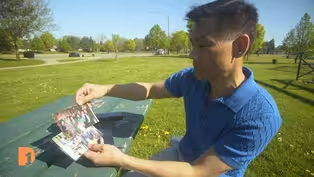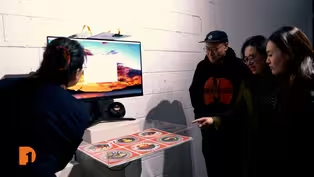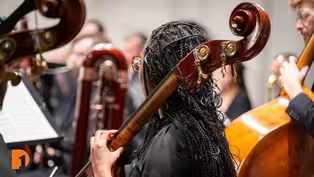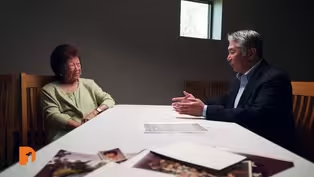
AAPI Story Series | Brenda Hu and Meaghan Kozar: Am I American Enough?
Clip: Season 9 Episode 46 | 5m 51sVideo has Closed Captions
Two women talk about their Asian American identities and what it means to be “American” enough.
Brenda Hu and Meaghan Kozar, two women who formed a lasting bond through their mutual interests in advocating for Asian Americans and other marginalized communities, talk about their experiences growing up and not feeling “American” enough. Hu shares her experiences growing up as a Chinese and Vietnamese kid in East Lansing, and Kozar talks about being a Korean adoptee from Minnesota.
Problems playing video? | Closed Captioning Feedback
Problems playing video? | Closed Captioning Feedback
One Detroit is a local public television program presented by Detroit PBS

AAPI Story Series | Brenda Hu and Meaghan Kozar: Am I American Enough?
Clip: Season 9 Episode 46 | 5m 51sVideo has Closed Captions
Brenda Hu and Meaghan Kozar, two women who formed a lasting bond through their mutual interests in advocating for Asian Americans and other marginalized communities, talk about their experiences growing up and not feeling “American” enough. Hu shares her experiences growing up as a Chinese and Vietnamese kid in East Lansing, and Kozar talks about being a Korean adoptee from Minnesota.
Problems playing video? | Closed Captioning Feedback
How to Watch One Detroit
One Detroit is available to stream on pbs.org and the free PBS App, available on iPhone, Apple TV, Android TV, Android smartphones, Amazon Fire TV, Amazon Fire Tablet, Roku, Samsung Smart TV, and Vizio.
Providing Support for PBS.org
Learn Moreabout PBS online sponsorship- The last time I really colored out was probably like, college, I'd say, when I was blonde.
Do you remember that?
- Blonde?
I don't remember.
- Oh, good.
- I think it was more of a auburn, - I'm glad you don't remember.
- Or something like that.
- Yeah, not memorable.
- So my parents immigrated to the United States during the Vietnam War, and when they first came to the United States, they didn't have anything, and they grew up as immigrants.
English was their second language.
And I think always, you know, translating for them and seeing the hardships and the challenges that they faced early on as a child made me really want to be an advocate for them and to give them a voice.
But I didn't know how to do that.
And I think as a child, growing up in East Lansing, Michigan, I always saw myself as not Asian enough.
Because even though I spoke Vietnamese, you know, it wasn't super great.
It was very casual.
And even though I spoke English, when I went to school, like no one really looked like me.
I wanted Lunchables for lunch, but instead, I got like fried rice because my mom was packing that for me at home.
And looking back at it as an adult now, like I admire and I'm so grateful for everything that my parents gave me, because it was the best that they could do.
And I don't think that I knew that being an Asian American was an identity option until I realized that Asian Americans were a thing.
And I didn't learn that until I went to college, because I think growing up, I didn't learn about Asian American history in school.
It was just US history.
And when we did learn about Asians, it was very much overseas.
And I was born here and I grew up here.
So I never felt Asian enough and I never felt American enough until I realized that that was an option, which you, Meaghan, helped me learn, actually.
- So my experience with being Asian and American is very interesting.
So I was adopted at the age of two from Seoul, Korea, and I was adopted into a white family in Minnesota.
- [Brenda] Yeah.
- [Meaghan] And it's interesting that from hearing your story and how I've impacted you or influenced you through being Asian American, my whole life was surrounded by trying to prove that I was Asian American, or I was not even Asian, but American because my schools, my neighborhood, my environment was all white and I was always reminded that I was Asian.
So even though I didn't have an accent, even though I didn't speak any Asian language or, you know, anything associated or stereotypical, ways we associate what an Asian is.
- Yeah.
- My traditions and my holidays, my customs, all of that were white.
- Yeah.
- And I didn't know another language.
So interestingly, I mean, there was one example.
I remember I went to elementary school, a private Catholic elementary school.
- Okay, mhm.
- And we always had to go to church, and they celebrated St. Patrick's Day.
And the priest asked the people in the audience, they said, you know, "If you're Irish, raise your hand."
And so I raised my hand.
- Okay.
- And the reason why I raised my hand, the priest had reached out and told my mom and he was laughing at it and they said, "Oh, how cute."
And I didn't understand what the issue was.
And the reason I raised my hand is because my name is Meaghan, and I was always told, it was spelled the Irish way.
- Oh!
- Yeah.
M-E-A-G-H-A-N, right?
- Yeah, yeah.
- And so my sister's a Shannon, my mom a Sheila.
And so to me, my identity was American.
- Yeah.
- And so to me, I always embraced, you know, being an American, just being, you know, just.
- Yeah.
- But I was always reminded I was Asian.
But when I came to other, you know, the universities, when I came to college and being a part of Asian American, you know, student organizations or activists areas, the perception is, I'm not Asian enough, right?
Ironically, I could be viewed as more Asian than something, 'cause I was actually born in Asia, right?
- Yeah.
- So it's a very complex, complicated.
- Yeah.
Yeah.
It's such a complex thing.
One identity, two ethnicity, and you know, how you define yourself, it comes back to labels, right?
Because I was also always reminded that I was Asian, especially at school when I worked, you know, at Abercrombie and Fitch because that was the cool thing to do back then.
Instead of just being like a great employee or being a great student or friend, I was always labeled as like, "Oh, you're my Asian friend.
Oh, Brenda's the best Asian employee that we have."
And I always thought, why do you need to label me?
Like, why can't we just be, and why can't we just be a part of society and fit in like we want to?
I think that's why, understanding my identity as like an Asian American was so important.
Video has Closed Captions
Clip: S9 Ep46 | 3m 29s | Vietnamese Americans living in metro Detroit reflect on the Fall of Saigon 50 years later. (3m 29s)
Interactive exhibition threads together Vietnamese American stories 50 years after Fall of Saigon
Video has Closed Captions
Clip: S9 Ep46 | 3m 30s | Artist Linh My Truong talks about her exhibit “Threads of Passage: From Vietnam to America.” (3m 30s)
One Detroit Weekend | Things to do around Detroit this weekend: May 16, 2025
Video has Closed Captions
Clip: S9 Ep46 | 1m 37s | A spring market, a collectibles fair, a comedy challenge and more events happening this weekend. (1m 37s)
Video has Closed Captions
Clip: S9 Ep46 | 6m 40s | Mary Kamidoi and Shinji Takahashi talk about the Japanese incarceration camps during World War II. (6m 40s)
Providing Support for PBS.org
Learn Moreabout PBS online sponsorshipSupport for PBS provided by:
One Detroit is a local public television program presented by Detroit PBS















